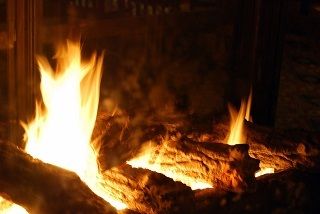From Guest Blogger Izzy: Which Fireplace Is Better For The Environment?

One area this environmental concern has the potential to influence purchases is fireplaces. While traditionally not as high on the agenda as things like fridges and TVs, certain fireplaces still carry a lot of components that will leave those worried about protecting our natural resources with a few concerns.
But which variety of fireplace is best for the environment? Well here are the three major types of fuels, and which ones are better for Mother Earth.
Gas
Even that sub title will likely be enough to inform those in the know that gas fireplaces probably aren’t the best fireplace for those who are environmentally concerned. “Gas” has lots of negative connotations, especially given that it is a non-renewable source of fuel.
But in defence of the fireplace industry, they have made many strides forward in making them more environmentally sound. For example, most of them now have efficiency ratings ranging from 75% to the higher 90%s, meaning less energy is being loss in the heating process. Research has also been put in to make them longer last, and more recyclable. But unfortunately, their fuel is a stumbling block that it is hard to get over in the race to declare the most environmentally friendly heating appliance.
Solid Fuel
In layman terms, this means wood and coal, so we are really talking more about stoves than fireplaces here. Solid fuel stoves have similar drawbacks to gas fires, in that they aren’t 100% efficient, and coal is another non-renewable fossil fuel. But wood burning stoves do have to distinct advantages.
Firstly, although it isn’t as renewable as say solar or wind power, wood is a much more plentiful resource than coal. This is especially true when you also consider that the stove will often only require a small amount of wood to work, while still producing enough heat to do it’s job sufficiently. So they are a better alternative to gas, but to what extent will depend on your individual feelings towards the renewable potential of trees.
Electric
Just as electric cars are seen as the environmentally sound alternative to petrol cars, electric fireplaces are perhaps the best fireplace for those concerned with conserving our natural resources. While the process of making electricity also involves the burning of fossil fuels for the most part, the market is awash with alternatives right now, including wind farms and solar panels. So you could conceivably run an electric fireplace on 100% green energy!
Plus, electric fireplaces are incredibly efficient. 99%+ efficient, in actual fact, as none of the heat they produce is lost in the process if any pre-existing chimney is blocked. And they are also incredibly durable, considering they only have one moving part, and no open flames within them.
They may not be ideal, but it is the best type of fireplace or stove for those looking to to reduce their environmental impact.
